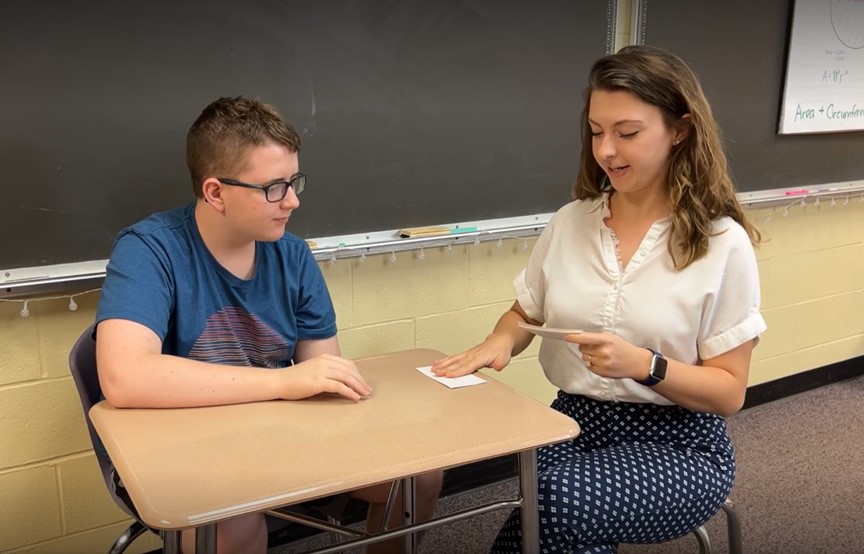Flashcards
The Intervention
Flashcards are designed to enhance students’ academic performance in the classroom through the development of study skills that can lead to improvements in grades on tests and quizzes. Initially, teachers provide more direction, constructive feedback, and reinforcement in order to ensure the youth is effectively creating and utilizing the flashcards. As the student builds independent skills, the teacher support is faded.

Steps to Implement
- Start by identifying specific content that could be effectively studied using flashcards. Most often, flashcards are used for learning vocabulary terms; however, they can also be used to learn a range of concepts or specific fact-based knowledge that requires rote memorization (e.g., historical dates; state capitals)
- Meet with the student to discuss their current study skills strategies and the importance of further developing those skills. During this meeting, the proper way to create flashcards can be taught and practiced. In this meeting, you should review the following:
- One side of the card should include a single term. The other side should include a short definition.
- Definitions should function only to remind the student of the meaning of the word but should not be a direct copy of the definition from the textbook or outline that has been provided.
- The act of creating flashcards (even without the practice) can be a helpful study activity for the student as it requires them to review the content and put it into a digestible, written format.
- After creating a set of flashcards, review the following about how to use them:
- To begin, the student should go through the flashcards and test individually, reading the definition, thinking of the term/definition on the other side, flipping the card over and checking accuracy. If correct, the card can be placed to the side. If incorrect, the card is placed in the back of the pile. This process continues until all flashcards have been responded to accurately.
- Next, the student should go through the cards that have been learned and continue to test, only turning the card if necessary. Once the student is able to go through all of the cards quickly, without check the answers, they are ready for the test or quiz.
Tips for Success
- Find a version of flashcards that works best for the student. For some students, hand-written paper flashcards will be preferred, while others may elect to use an electronic or internet program that allows for flashcard creation and practice.
- Regardless of the platform being used, it can be an important and helpful step for the student to create the cards. While it may seem easier or more efficient to just provide the student with pre-made cards, consider whether reviewing the content and summarizing it on the flashcards could, on its own, be a useful study skill.
- To increase engagement once the student has begun practicing the cards, they can create a game by seeing how quickly they can correctly identify all flashcards.
- It is often helpful for students to practice the cards on both sides. For example, identifying the term based on the definition and providing the definition based on the term.
- Flashcards can be used as an independent study tool; however, for some youth, reviewing with a parent or teacher may increase engagement and allow opportunities for external feedback and positive reinforcements. It can be exciting for youth to show their teacher or caregiver how much they have learned.
- If you need help implementing or evaluating this intervention, it may be helpful to seek out consultation from your school mental health professional or intervention team leader.
Evidence of Effectiveness
Flash cards have been rated as “not evaluated” at both the elementary and secondary levels as they have not been rigorously evaluated. Therefore, we cannot determine a level of effectiveness.
Elementary: Flash cards have not been rigorously studied among elementary students to determine their effectiveness.
Secondary: Flash cards have not been rigorously studied among secondary students to determine their effectiveness.
Recommendations: Although flashcards have not been rigorously studied at the elementary or secondary level, we recommend the use of flashcards to improve homework and classroom accuracy and to improve test scores.
Materials
Intervention Scorecard
This intervention is recommended for the following presenting problems.
Select an age group:
Recommended| Presenting Problem | Effectiveness | Magnitude | Effort | ||
|---|---|---|---|---|---|
Other suitable presenting problems